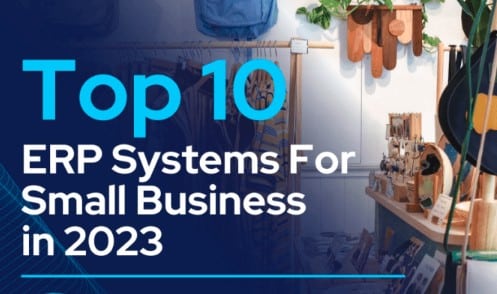In today’s fast-paced business world, small businesses need efficient tools to manage their operations and enhance productivity. Enterprise Resource Planning (ERP) systems play a crucial role in streamlining business processes, automating tasks, and providing valuable insights for making informed decisions. In this comprehensive article, we will explore the Top 10 ERP Systems For Small businesses to empower growth and efficiency.
The Power of ERP Systems for Small Businesses
ERP systems are all-in-one software solutions that integrate various business functions, such as accounting, inventory management, human resources, and customer relationship management (CRM), into a single unified platform. By consolidating these functions, small businesses can improve collaboration, reduce manual work, and optimize resource allocation.
Top 10 ERP Systems for Small Business
Below are the top 10 erp systems for small business, each offering unique features and advantages:
1. AcmeERP
AcmeERP is a user-friendly ERP system that provides seamless integration with various business modules. Its intuitive interface and real-time analytics make it an ideal choice for small businesses looking to enhance operational efficiency.
2. BizFlow360
BizFlow360 offers comprehensive ERP solutions, including financial management, supply chain management, and project tracking. It’s a scalable option, allowing small businesses to expand without worrying about outgrowing their ERP platform.
3. SMEConnect
SMEConnect focuses on affordability and ease of use, making it perfect for small businesses with limited resources. It provides customizable modules, enabling businesses to adapt the ERP system to their unique requirements.
4. FlexiERP
FlexiERP is a cloud-based ERP system that offers a wide range of applications, from accounting and sales to production and CRM. Its flexibility and scalability make it suitable for growing small businesses.
5. NetSuite
NetSuite is a comprehensive ERP solution with advanced functionalities designed for small and mid-sized businesses. Its real-time insights and automation capabilities can significantly improve business performance.
6. ERPNext
ERPNext is an open-source ERP system, making it cost-effective for small businesses with budget constraints. Despite being open-source, it offers a wide array of features and a supportive community.
7. Zoho One
Zoho One is an integrated suite of business applications, including ERP, CRM, and marketing automation. It is an excellent choice for small businesses looking to streamline multiple aspects of their operations.
8. SAP Business One
SAP Business One is a powerful ERP solution designed specifically for small businesses. It provides real-time data access and analytics to help entrepreneurs make data-driven decisions.
9. Microsoft Dynamics 365 Business Central
Microsoft Dynamics 365 Business Central offers a flexible ERP system that seamlessly integrates with other Microsoft tools. Small businesses can leverage its cloud-based capabilities to boost productivity.
10. Oracle NetSuite
Oracle NetSuite is a cloud-based ERP platform that caters to the needs of small businesses across various industries. Its scalability and customizable modules make it an attractive choice.
The Key Benefits of Using ERP Systems for Small Business
- Streamlined Operations: ERP systems consolidate various business processes, eliminating redundant tasks and minimizing errors.
- Data-Driven Decision Making: ERP systems provide real-time insights and analytics, enabling data-driven decision making for better business outcomes.
- Improved Collaboration: With a centralized database, ERP systems promote seamless collaboration among employees, departments, and even remote teams.
- Enhanced Customer Service: Access to customer information allows businesses to provide personalized and efficient customer service.
- Cost Savings: By automating tasks and improving efficiency, ERP systems help reduce operational costs.
FAQs
Q: How can ERP systems benefit small businesses?
A: ERP systems benefit small businesses by streamlining operations, providing real-time insights, improving collaboration, enhancing customer service, and leading to cost savings.
Q: Are ERP systems suitable for small businesses with limited budgets?
A: Yes, there are affordable ERP systems like SMEConnect and open-source options like ERPNext that cater to small businesses with limited budgets.
Q: Can ERP systems be customized to meet unique business needs?
A: Yes, most ERP systems offer customizable modules, allowing businesses to tailor the platform to their specific requirements.
Q: What are the main differences between cloud-based and on-premise ERP systems?
A: Cloud-based ERP systems are hosted on remote servers and accessed through the internet, offering flexibility and scalability. On-premise ERP systems are hosted locally on the company’s servers, providing more control but requiring higher initial investments.
Q: Can ERP systems integrate with other third-party applications?
A: Yes, many ERP systems offer integration capabilities, allowing them to work seamlessly with other business tools and applications.
Q: What factors should small businesses consider when choosing an ERP system?
A: Small businesses should consider factors such as cost, scalability, user-friendliness, industry-specific features, and customer support when selecting an ERP system.
Conclusion: top 10 erp systems for small business
In conclusion, implementing the right ERP system can be a game-changer for small businesses, empowering them with growth, efficiency, and data-driven decision-making capabilities. The top 10 ERP systems mentioned in this article cater to the unique needs of small businesses, offering a range of features and benefits to drive success.
Evaluate your business requirements, explore the options, and make an informed choice to elevate your small business to new heights with an advanced ERP system.
